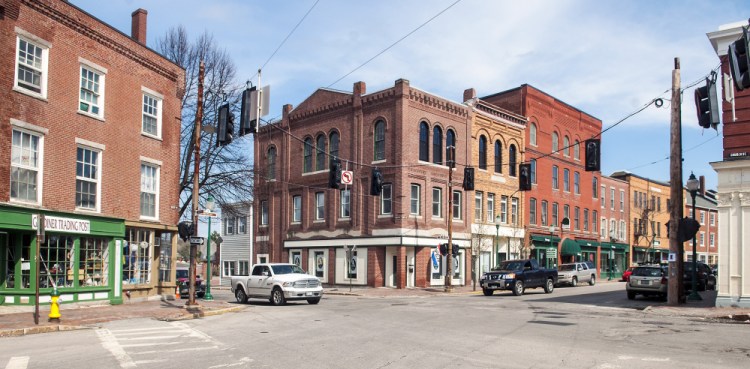Gardiner has been awarded a grant from the Maine Historic Preservation Commission to begin addressing the impact of flooding on the riverfront city.
Through a Historic Preservation Fund Grant, Gardiner will get $7,500 to help pay for elevation certificates for buildings in the downtown historic district.
“It’s important because it allows folks to potentially have a lower premium,” Patrick Wright, executive director of Gardiner Main Street, said Wednesday. “The rating is based on how much above or below the first finished floor is compared to the base flood elevation.”
If property owners choose to flood-proof their buildings, Wright said, that’s the point above which mechanical systems ought to be moved and below which flood-proof materials ought to be used.
Gardiner officials have been trying to figure out options for its downtown property owners.
During the city’s history, the flooding Kennebec River has filled the city’s low-lying areas with water a number of times. Thirty years ago, the largest flood in Maine’s recorded history pushed water into riverside downtowns throughout the Kennebec’s watershed, including Gardiner.
Gardiner’s downtown historic district is entirely in the mapped flood zone. Because of that, anyone who has bought or plans to buy a building with a mortgage is required to carry flood insurance through the Nation Flood Insurance Program, but the cost of that insurance is increasing.
The NFIP is administered by the Federal Emergency Management Agency and requires periodic congressional reauthorization. The program is currently $25 billion in debt, but that amount is expected to increase when claims from hurricanes Harvey, Irma, Maria and Nate start to be paid out. To cure the deficit, premiums paid by property owners are expected to increase until the debt is repaid. Congress voted in September for a short-term reauthorization, and the matter is expected to be considered again before the end of the year.
Christi Mitchell, assistant director of the Maine Historic Preservation Commission, said one of the reasons the commission liked Gardiner’s application is that it realized that planning for the impacts of climate change on historic buildings needs to be a priority.
“This is the first step in a much bigger project,” Mitchell said.
Wright said the city is seeking bids now to identify a company to do the work. Generally a flood elevation certificate costs about $500, but by offering the chance to do a number of them at the same time, he said city officials hope the price might drop.
Under the program, the city, through this grant, would pay half and the building owner would pay the other half.
Jessica Lowell — 621-5632
Twitter: @JLowellKJ
Send questions/comments to the editors.



Success. Please wait for the page to reload. If the page does not reload within 5 seconds, please refresh the page.
Enter your email and password to access comments.
Hi, to comment on stories you must . This profile is in addition to your subscription and website login.
Already have a commenting profile? .
Invalid username/password.
Please check your email to confirm and complete your registration.
Only subscribers are eligible to post comments. Please subscribe or login first for digital access. Here’s why.
Use the form below to reset your password. When you've submitted your account email, we will send an email with a reset code.